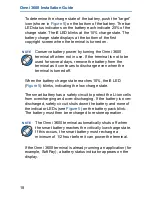
NOTE TO INSTALLER
This equipment complies with the FCC Regulation for Class A devices, Subpart J of Part 15.
Shielded, grounded interface cables were used on all ports for FCC radiated emission testing.
The manufacturer is not responsible for any violation of the FCC Regulation for Class A
devices that is caused by unauthorized modification of the equipment, or caused by
equipment installation not in accordance with the instructions in this manual.
This equipment generates, uses, and can radiate radio frequency energy and may cause radio or
television interference. All user equipment that interfaces with other products should be
connected with shielded cables. (Contact a local dealer for more information on shielded cable
assemblies and their availability.)
There is no guarantee that interference will not occur. If radio or television interference occurs
(this can be determined by turning the equipment off and on while the radio or television is
on), the user is solely responsible for correcting the interference and is encouraged to take one
or more of these measures:
1.
Reorient the receiving antenna.
2.
Relocate the equipment, or move the equipment away from the receiver.
3.
Plug the equipment into a different outlet so the unit and receiver are on different branch
circuits.
4.
Consult the dealer or an experienced radio/television technician.
It is also suggested that the user read the FCC booklet entitled How to Identify and Resolve
Radio-TV Interference Problems. The booklet is available from the US Government Printing
Office, Washington, DC 20402. (When ordering the booklet, specify stock number 04-000-
00345-4.)
Site Preparation
The screen display geometry on terminal products is aligned using magnetic devices. External
magnetic fields created by other types of electronic equipment, such as printers, in very close
proximity to the terminal, may cause minor display distortion.
Examples of display distortion include:
þ
Shaky video
þ
Wavy lines
þ
Tilted display
This magnetic field interaction only occurs over a very short distance, normally less than
twelve inches, and can be corrected by separating the equipment and/or slightly reorienting
the display.

































